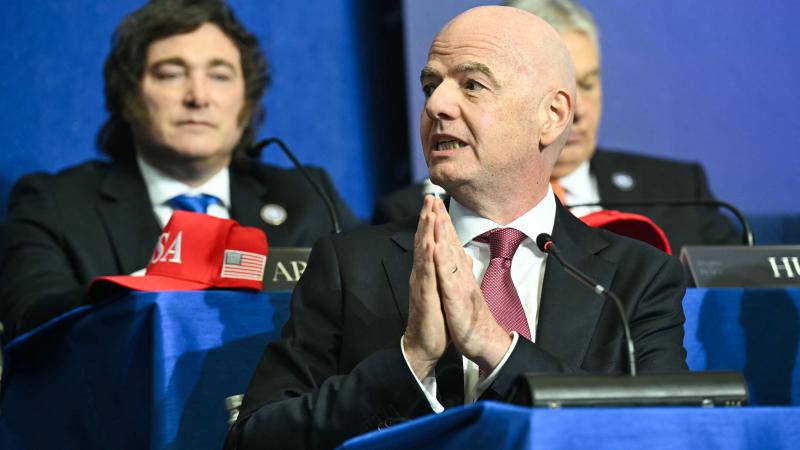U.S. House's latest China select committee report calls for an economic ‘reset’ with Beijing
The committee recommends Congress take action to increase tariffs to level the playing field, supports new bipartisan consensus on China. Data from The World Bank suggests that the Chinese economy surpassed that of the U.S. by almost $5 trillion in 2022.
The House committee that covers the strategic competition between the United States and China on Tuesday released a 53-page report outlining its strategy and recommendations for winning America’s economic competition with the People’s Republic of China.
The committee report concludes a failure in the economic engagement strategy and called for a “reset” in the economic relationship between the United States and China that would include restoring tools for higher tariffs and the use of tariff revenue to bolster American security and competitiveness, signaling endurance of a new bipartisan consensus that began in the Trump Administration.
The committee organized its recommendations as three pillars for winning the economic competition with China: reset the economic relationship, stem the flow of U.S. capital and technology to China’s military, and invest in U.S. technology leadership and economic resilience.
You can read the report below:
The report is the culmination of almost a year of work by the House Select Committee on the Strategic Competition between the United States and the Chinese Communist Party. That select committee was instituted after the 2022 midterms with the mission to “to investigate and submit policy recommendations on the status of the Chinese Communist Party’s economic, technological, and security progress and its competition with the United States.”
The committee concludes a “reset “ of the economic relationship is vital to “correct 30 years of misguided policy,” according to the press release. The reset is needed, the committee claims, because China has failed to live up to commitments of global trade it agreed to as part of its accession to the World Trade Organization (WTO) by subsidizing domestic industry and using state-owned enterprises to undermine American companies’ ability to compete fairly.
Because of these practices, and China’s repeated history of not punishing theft of intellectual property and trade secrets, “unfettered economic ties with the PRC poses a direct threat to U.S. national and economic security, financial stability, and values,” the committee wrote.
To respond, the committee urges Congress to restore some of the economic leverage that the United States had before it granted China Permanent Normal Trade Relations status and helped the communist country’s accession to the WTO in in 2000, at the twilight of President Clinton’s second term.
In November of 1999, the United States and China reached an agreement after 13 years to permit the communist country into the WTO, which at the time, the State Department said would benefit “American business, workers, and farmers” as well as open China up to the WTO’s enforcement mechanisms to level the playing field, according to a fact sheet released by the State Department.
At the time, Clinton’s State Department also promised that China would have to restructure its “trade regime” to meet WTO obligations, including by implementing market reforms and increasing economic freedom. It also said that China would be “exposed to global competition” which would spur these economic reforms as well as political reforms that could help preserve peace and regional stability as well as improve cooperation between the United States and China.
The committee’s new report concludes that these assumptions were incorrect. It continues to explain that China has “abandoned the path of economic and political reform, doubled down on repressive activities at home, and engaged in destabilizing activities in the region.” The committee also said that the Chinese government has broken a slew of promises related to its accession to the WTO that would have helped U.S. industries compete fairly with their Chinese counterparts.
“The Select Committee made a bipartisan finding that giving China most favored nation treatment for trade 23 years ago was a tragic mistake,” Ambassador Robert Lighthizer, Former United States Trade Representative in the Trump Administration, told the committee. “The committee calling for new higher tariffs on China is an historic event,” he continued.
“The failed policy of the past cost millions of American workers their jobs and the country trillions of dollars of wealth. It crippled many communities and put our national security at risk. I hope the committees of jurisdiction act quickly to implement these findings and set America on a course of greater prosperity and security for all working families,” Lighthizer said.
Lighthizer was at the forefront of the Trump Administration’s efforts to rebalance the U.S trade relationship with China, which went against the grain of established thinking in Washington, D.C. and even against his own Republican Party’s free trade orthodoxy.
Former President Trump first called for pushing back against China’s unfair trade practices during the 2016 campaign. When initial trade negotiations with China failed, the Trump Administration imposed tariffs on all imported washing machines and solar panels -- not just those from China -- in early 2018. This marked the beginning of an escalating trade war that would characterize Trump’s presidency. The tariff war would escalate to include steel and aluminum and China also responded with its own tariffs on American goods.
In a signal that a new bipartisan consensus on the trade threat from China was forming, President Biden kept most of President Trump’s tariffs in place after he took office. Additionally, the Biden Administration has attempted to hold China accountable to the Phase 2 trade deal negotiated with President Trump, despite China not upholding its commitments.
Now, bipartisan agreement on these policies seem to have solidified with the select committee’s report, which included input from both the Republican and Democratic members of the committee.
“With this report, the Select Committee has shown that the bipartisan will exists to meet the call of history. It embraces the clear reality that our current economic relationship with the People's Republic of China needs to be reset in order to serve the economic and national security interests of the United States, while offering nearly 150 bipartisan recommendations for Congress to legislate,” the committee’s ranking member, Raja Krishnamoorthi, D-Ill., said in a statement.
“Collectively, these recommendations will reset the terms of our relationship with the PRC, prevent the flow of American capital and technology from supporting its military advances and human rights abuses, and build collective economic resilience in concert with our allies and partners while ensuring American leadership for decades to come,” he continued.
The select committee, which cannot advance legislation on its own by House rules, urged the full Congress to take on its bipartisan recommendations to reset the economic relationship and secure the United States in its competition with China going forward.
"The strategy presented here includes sets of findings and recommendations for each pillar. Taken together, they would level the economic playing field, reduce the PRC’s hold on U.S. and allied critical supply chains, and invest in a future of continued economic and technological leadership for the United States and its like-minded allies and partners,” the report concluded.
The Facts Inside Our Reporter's Notebook
Documents
Links
- instituted after the 2022 midterms
- according to the press release
- fact sheet released by the State Department
- State Department also promised
- told the committee
- at the forefront
- Trump Administration imposed tariffs on washing machines and solar panels
- President Biden kept most of President Trumpâs tariffs in place
- Raja Krishnamoorthi, D-Ill., said in a statement
















